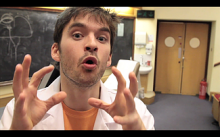Space X, Newly Formed Oxygen, Yeast 2.0, and Gene Editing
(Inside Science) -- On this monthly science recap, Alistair Jennings from Inside Science sums up some of the most interesting science that’s coming our way in 2020 -- we hope to see many scientific projects come to fruition. Among them, Space X will launch the first manned commercial flight to the International Space Station. Three new robotic rovers from Europe, China and the U.S will be headed into space with Mars as their destination. NASA’s Mars 2020 rover, launching July or August this year, is aiming for Jezero Crater, the site of an ancient lake. If it makes it, the rover will analyze the local rocks and chemicals for signs of past life on the red planet. 2020 should see the completion of the "Yeast 2.0" project, a consortium of 11 labs, across the world, working together to streamline and partially replace the entire genome of baker’s yeast -- the most heavily studied complex single-celled organism on the planet. Gene editing is the future. This time last year, Chinese scientist He Jiankui edited the genome of twin baby girls in an attempt to decrease their risk of HIV. In 2020, Russian scientist Denis Rebrikov wants to do the same thing, with the same gene. This has provoked outcry from the international community, but the real sticking point is the Russian government -- this year, they will decide if Rebrikov is legally allowed to go ahead.
References:
1. https://www.spacex.com/missions
3. https://mars.nasa.gov/mars2020/
4. http://www.hayabusa2.jaxa.jp/en/
5. http://syntheticyeast.org/sc2-0/
6. https://www.nature.com/articles/d41586-019-03018-0
7. https://www.scientificamerican.com/article/what-crispr-baby-prison-sentences-mean-for-research/

